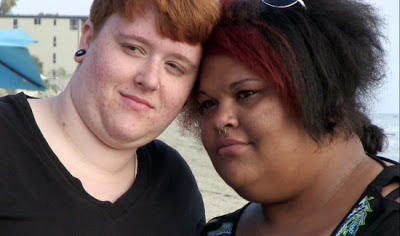It is very rare that I sit
and watch television, but like so many of my peers and innumerable critics, I
love HBO’s Girls. Perhaps this is
because Girls does not feel like
television. Girls is about as close
as you can get to watching the real world without watching The Real World (which, arguably, is even less real than Girls). The series begins with
24-year-old Hannah Horvath being financially dumped by her parents, and the
rest is her shaky attempt at navigating professional and personal relationships
as a responsible young adult. Watching Hannah careen into near-disaster every
week has mounted my understanding that this is the offbeat girl next door
struggling with a lot more than trying to keep her shorteralls from riding up
in the middle.
It wasn’t until I read one
article on Slate in which the author praises Girls creator Lena Dunham for daring to feature such an “unlikeable protagonist,” as Hannah is, that something clicked. I had never considered
Hannah unlikeable –rude, awkward, inappropriate, selfish, immature, naïve – but
never flat out unlikeable. Now with the understanding that Hannah is not meant
to be liked (such as is the unintentional comic relief Shoshanna)—she joins the
ranks of brutishly candid Jessa and idealistic, coldblooded Marnie, and it
makes the series just that much better. It’s like now I have relinquished the
part of me that ignored the shiver down my spine when Hannah does something
like destroy a job interview with a date rape joke, or casually attack a
fling’s political beliefs in response to negative feedback about an essay she’d
written.
On a basic level, I have
identified with Hannah in many ways. She is a writer, feeling things for the
thrill of feeling them, going through life like some sort of self-appointed
journalist guinea pig, ready to share the well-written details of every awkward
tryst for even the possibility of some kind of artistic impact. She is a recent
college graduate that has felt the burn of the unpaid internship. She’s dabbled
in jobs she feels overqualified for, but still manages to somehow fuck them all
up. She’s engaged in unhealthy relationships, both sexual and platonic. She is
fucked up and often unwilling to acknowledge the ways in which she’s
responsible for her situations. She is everything I hate to admit I am.
Growing up, there were no
shows like Girls (and if there was,
would I have even been interested?). Instead, I watched shows like Friends. While each character on Friends is carefully crafted into a
“type” – Phoebe is quirky, Monica is anal, and Rachel is a recovering spoiled
brat – Girls accomplishes the same
while retaining realistic levels of flexibility, spontaneity, and complexity.
Hannah’s uncertainty about life can be read as quirky and at other times
flippant. She seems to quit jobs as a hobby, and has little concept of
professionalism. Her self-assured verbal declarations may have sincere
intentions but can come across nauseatingly privileged and solipsistic (“Maybe
you are the bad friend and I’m the good friend,” “My problem is that I’m too
kind, I’m too compassionate”). Hannah says the things we wouldn’t dare to, for
common respect to social decency: after writing about Marnie’s agonizing
relationship with Charlie in her notebook, which Charlie then read, leading to
the two’s breakup, Hannah asks: “But did you like it? Just as a piece of
writing.”
She is caustically cheeky about
the most sensitive of subjects: the root of a nasty divorce, a lover’s
political beliefs, a friend’s abortion. She is often a fool in her flings, like
sending a raunchy picture in response to a sext that Adam said was not intended
for her. She throws caution to the wind, including making blatantly bad
decisions with a Venti cup of confidence—procuring coke for a writing
assignment and having a titties-out romp with Elijah culminating in her
sleeping with the junkie downstairs; telling her boss that he can fuck her,
then attempting to extort and then threaten to sue him when he declines;
chasing down a stranger from the coffee shop and kissing him after confessing
she’s been throwing the shop’s garbage in his trash cans.
Hannah reminds me of
myself in the ways I don’t want to be reminded. Although we are the same age,
at 24, she resembles my 19-year-old self in philosophy and demeanor way more
than I am comfortable admitting.
She quotes Fiona Apple in
an episode, saying she just wants to feel everything –but in the process, she’s
numbing herself to feeling anything. When brief fling Sandy says he loves
hanging out with her, she goes on an annoying mini-rant about not wanting him
to use the word “love” at all. Hannah is not unlike George Costanza, a
character you love to be angry at, because she is simultaneously frustrating
and hilarious. Lena Dunham has done a wonderful job of creating a character
that speaks to parts of me I’d prefer to disown. I imagine it to be similar to
how someone secretly interested in murder would feel watching Dexter – so wrong, but so, so
right. Hannah Horvath represents the struggle between being an adventurous
woman with HPV and an e-book deal, and having the stable income to afford rent
each month. As she attempts to build the bridge that joins the two, we can join
along on her journey, laughing (and sometimes pointing), pretending that her
identity is less reflective of our own than it really is.



